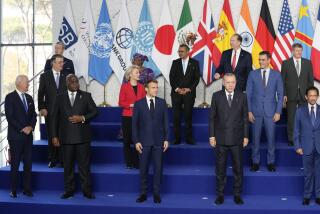U.S. presses Europe to reconsider plans for new digital tax

The U.S. is pressing European Union officials to reconsider plans to enact a new digital tax across the 27-member bloc in a dispute that threatens to undermine significant progress made recently toward a global corporate tax agreement.
Ahead of this week’s meeting in Venice among finance ministers from the Group of 20 economies, U.S. Treasury Department officials indicated in a call with reporters Tuesday that a potential digital tax proposal might fall afoul of a deal struck last week that aims to eliminate so-called digital service taxes. The U.S. believes such taxes discriminate against U.S. companies.
Treasury officials on Tuesday’s call acknowledged that European officials are under political pressure not to abandon plans to tax tech giants. They said that while EU officials see the new measure as complying with the international agreement, the U.S. officials emphasized that it’s impossible to know whether it will be compatible until the full text of a broader accord is reached, which is targeted for October.
Treasury Secretary Janet L. Yellen spoke Tuesday with Margrethe Vestager, the EU’s executive vice president for digital issues. Vestager was due to propose a new EU tax on technology companies’ revenues July 20, a week later than planned, according to a document seen by Bloomberg News.
In a deal brokered at the Organization for Economic Cooperation and Development, 130 countries and jurisdictions last week endorsed a plan to set a minimum tax rate for corporations along with rules to share the spoils from multinational firms. The latter portion is meant to deal with companies such as Facebook Inc. and Amazon.com Inc., which garner much of their business through cross-border digital commerce. That agreement comes with a deal on repealing existing laws — and preventing new laws — that attempt to tax cross-border digital sales.
While the OECD agreement called for a global minimum tax rate of “at least 15%,” in line with a U.S. proposal, Treasury officials said the U.S. is still pushing to set that rate somewhere above 15%. The Biden administration has separately proposed a 21% rate for the overseas earnings of U.S. businesses.
In the briefing, Treasury officials also answered questions about how U.S. domestic politics represent a hurdle for the nascent global agreement. One official said the portion of the deal agreeing to a redistribution of corporate taxes based on where companies do business — not just where they are based — would require a multilateral treaty.
The U.S. Constitution requires international treaties struck by a president receive a two-thirds majority for approval in the Senate, which may represent a significant challenge given that President Biden’s Democrats make up just half of the chamber.
Treasury officials said the U.S. proposal that led to the tax-redistribution deal was designed to appeal to lawmakers from both parties, as it avoided a focus on only digital companies or targeting U.S. business. The Treasury has also said the U.S. will not lose tax revenue in the deal.
Following the announcement of last week’s OECD agreement, Kevin Brady of Texas, the senior Republican on the House Ways and Means Committee, set the tone of his party’s response when he issued a statement calling the deal a “dangerous economic surrender.”
Separately, regarding the International Monetary Fund’s plans to create $650 billion of new reserves, Treasury officials said the U.S. supports alternative methods for channeling so-called special drawing rights to needy countries, including a proposal for a new trust.
The G-20 meeting is also expected to focus renewed attention among rich countries on the economic recovery from the COVID-19 pandemic, as well as on efforts to continue containing the virus.
An official said Yellen will try to convince other countries that it’s not yet time to withdraw fiscal support for measures aimed at fighting the virus and its economic impact.
Bloomberg writers Hamza Ali and Saleha Mohsin contributed to this report.






